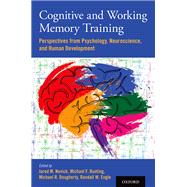Cognitive and Working Memory Training Perspectives from Psychology, Neuroscience, and Human Development
, by Novick, Jared M.; Bunting, Michael F.; Dougherty, Michael R.; Engle, Randall W.- ISBN: 9780199974467 | 0199974462
- Cover: Hardcover
- Copyright: 12/3/2019
Cognitive and Working Memory Training assembles an interdisciplinary group of distinguished authors--all experts in the field--who have been testing the efficacy of cognitive and working memory training using a combination of behavioral, neuroimaging, meta-analytic, and computational modelling methods. This edited volume is a defining resource on the practicality and utility of the field of cognitive training research in general, and working memory training in particular. Importantly, one focus of the book is on the notion of transfer--namely, the extent to which cognitive training--be it through music, video-game play, or working memory demanding interventions at school--generalizes to learning and performance measures that were decidedly not part of the training regimen. As most cognitive scientists (and perhaps many casual observers) recognize, the notions of cognitive training and transfer have been widely controversial for many reasons, including disagreement over the reliability of outcomes and consensus on methodological "best practices," and even the ecological validity of laboratory-based tests. This collection does not resolve these debates of course; but its contribution is to address them directly by creating an exchange in a single compendium among scientists who, in separate research publications, do not always reach the same conclusions. The book is organized around comprehensive overview chapters from different disciplinary perspectives--Cognitive Psychology (by Hicks and Engle), Neuroscience (by Kuchinsky and Haarmann), and Development (by Ling and Diamond)--that define major issues, terms, and themes in the field, with a pointed set of challenge questions to which other scientists respond in subsequent chapters. The goal of this volume is to educate. It is designed for students and researchers, and perhaps the armchair psychologist. Crucially, the contributors recognize that it is good for science to persistently confront our understanding of an area: Debate and alternative viewpoints, backed by theory, data, and inferences drawn from the evidence, is what advances scientific knowledge. This book probes established paradigms in cognitive training research, and the long-form of these chapters (not found in scientific journals) allows detailed exploration of the current state of the science. Such breadth intends to invite novel ways of thinking about the nature of cognitive and perceptual plasticity, which may enlighten either new efforts at training, new inferences about prior results, or both.






